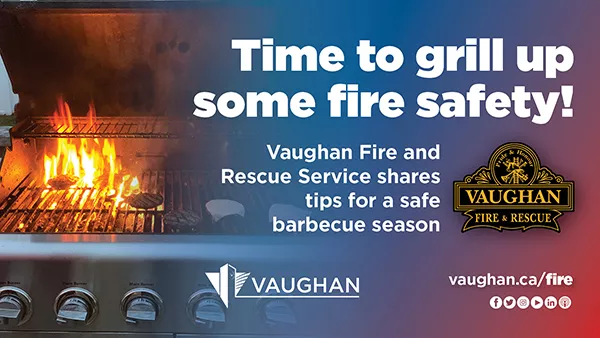Time to grill up some fire safety!
Vaughan Fire and Rescue Service shares tips for a safe
barbecue season
Barbecue season is
here, and you may be getting ready to cook out in the warm weather. Vaughan
Fire and Rescue Service (VFRS) wants to remind you of the importance of fire
safety and prevention when grilling up a storm this season.
When barbecuing, keep these safety tips top of mind:
- Use barbecues outdoors only. They produce carbon monoxide, a scentless, poisonous gas that can be fatal in an enclosed space.
- Ensure all burner ports are free of rust, dirt or cobwebs. Use a pipe cleaner or wire to ensure they are clear of any obstructions.
- Check hose and cylinder connections to make sure they are in good condition. To look for leaks, brush a mixture of 50 per cent soap and 50 per cent water onto all hoses and connections and look for bubbles. Replace, repair or tighten any connections until bubbles are gone. Never use a match or lighter to check for leaks.
- Clean out grease traps and keep grill areas free of debris.
- Place the barbecue in a safe area away from combustible materials, buildings and fences. Radiant heat from a barbecue can damage siding on the exterior of a home or shed.
- Light the barbecue with the lid open. Turn off the gas and wait five minutes if the burner does not ignite. Keep the lid open, then try again.
When using charcoal grills, only use charcoal briquettes (a
compressed chunk of coal dust or charcoal) explicitly designed for that
purpose and charcoal lighting fluids to ignite. Sprinkle the briquettes
with lighter fluid and allow it to soak in, then wait approximately 10 minutes.
Never add fluid after igniting the barbecue and never use gasoline to light a
barbecue.
Using propane
- Always carry and transport a propane cylinder in a car in an upright position with the safety valve on top. Ensure the vehicle windows are open when transporting.
- Never leave a cylinder in a parked car with the windows up. Heat can build up quickly and this could cause an explosion.
- Do not store propane inside a building, including a garage. Propane gas is heavier than air – if a cylinder leaks, the escaping gas will settle near the ground. A spark from the pilot light of your furnace, hot water heater or fireplace can cause ignition at any time.
For
updates and news as they happen, subscribe to Vaughan News and follow the official corporate channels on Twitter, Facebook, Instagram and LinkedIn.
-30-

